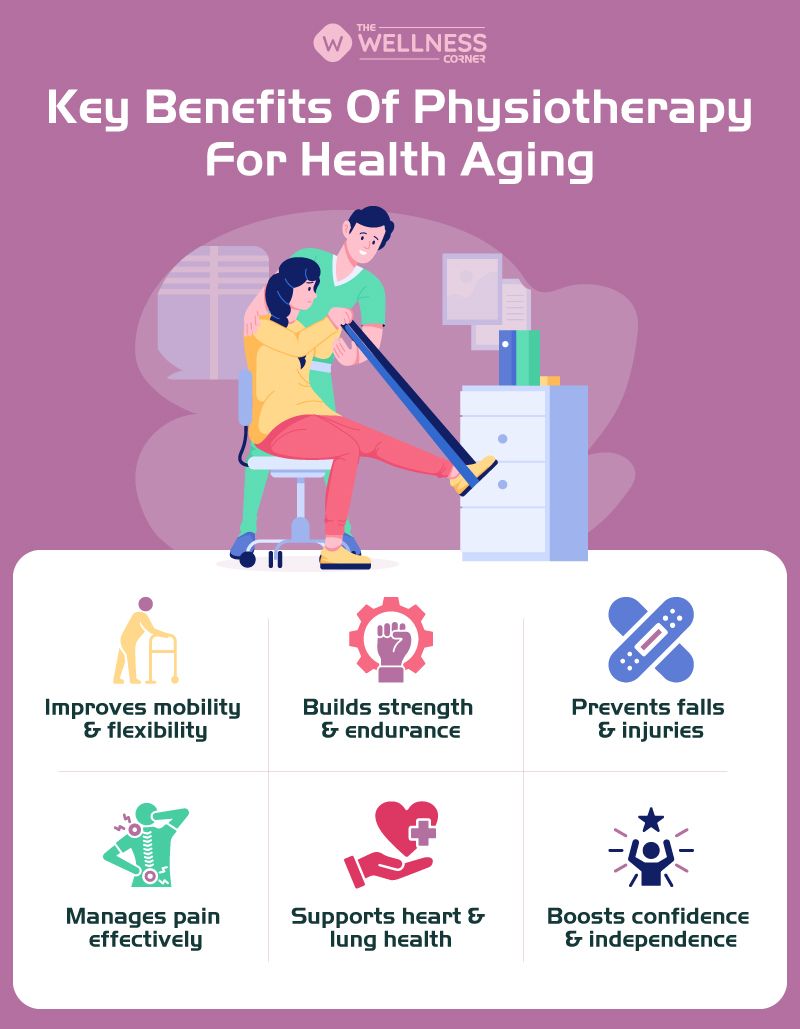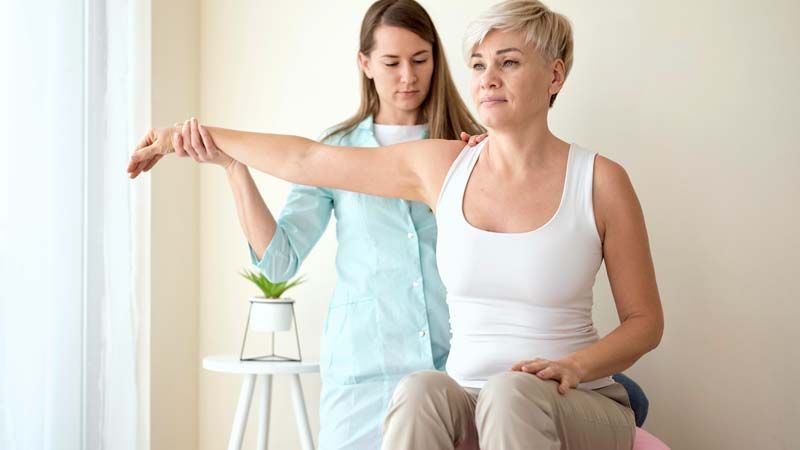Healthy Ageing With Physiotherapy: Stay Mobile, Stay Independent
- 3 months ago
Growing older is a natural part of life, but it doesn’t have to come at the cost of your independence. Many believe that growing older inevitably brings pain, stiffness, and reduced mobility. In reality, with proper care and healthy lifestyle habits, seniors can stay active, independent, and enjoy a high quality of life. Physiotherapy plays a key role in making this possible.
Physiotherapy is not just for recovery after injuries; it’s a science-backed approach to maintaining mobility, preventing health complications, and promoting overall well-being in older adults. Let’s explore how physiotherapy supports healthy ageing and why it should be an essential part of every senior’s life.
Understanding Healthy Ageing
According to the World Health Organization (WHO), healthy ageing is the process of building and sustaining the abilities that allow older adults to live well and maintain their overall well-being. In simple terms, it’s about staying active, engaged, and independent for as long as possible.
But with ageing, certain natural changes occur:
- Muscle loss (sarcopenia): Strength and endurance decline with time.
- Bone density reduction: Osteoporosis and fractures become more common.
- Joint stiffness: Arthritis and wear-and-tear make movement harder.
- Slower reflexes: Poor balance increases the likelihood of falls.
- Chronic conditions: Long-term health issues like diabetes, heart disease, and stroke may reduce mobility.
While these changes are natural, they don’t mean life has to slow down. Physiotherapy provides tools, exercises, and guidance that help older adults maintain strength, prevent injuries, and stay mobile.
Why is Physiotherapy Essential in Ageing?
Physiotherapy helps enhance mobility, build strength, improve balance, and manage pain—key factors that support independent living. Unlike general exercise, physiotherapy is tailored to an individual’s specific needs, health conditions, and goals.
Here’s why it’s so important:
- Personalized Care – Every person ages differently—physiotherapists design plans based on individual needs.
- Safe & Supervised Exercises – Reduce the risk of injuries while exercising.
- Holistic Approach – It’s not just about easing pain; it’s about enhancing overall quality of life.
- Long-Term Benefits – Prevents future complications, unlike quick fixes.

Key Benefits of Physiotherapy for Seniors
1. Improves Mobility and Flexibility
Simple tasks like bending, walking, or reaching can become harder with age. Physiotherapy utilizes stretching and mobility exercises to maintain joint flexibility, thereby reducing stiffness and enhancing movement.
2. Builds Strength and Endurance
Loss of muscle mass can limit independence. Targeted strengthening exercises preserve muscle power, making it easier to lift groceries, climb stairs, or carry out daily tasks without assistance.
3. Prevents Falls and Injuries
Older adults are at the highest risk of falling and sustaining injuries. Balance and coordination training in physiotherapy helps reduce fall risks, enabling seniors to move with confidence.
4. Manages Chronic Pain
Conditions like arthritis, back pain, and osteoporosis can be managed with physiotherapy techniques such as manual therapy, low-impact exercises, and posture correction. This reduces dependence on pain medications.
5. Supports Heart and Lung Health
Physiotherapists often incorporate aerobic and breathing exercises that keep the cardiovascular and respiratory systems strong, which is crucial for energy and stamina.
6. Boosts Independence and Confidence
When seniors can move with less pain and more strength, they feel empowered. It is this confidence that allows one to live more independently in daily life.
Common Physiotherapy Approaches for Older Adults
- Exercise Therapy: Strength training, stretching, and aerobic exercises customized for seniors.
- Balance and Coordination Training: Helps reduce fall risks and improves stability.
- Manual Therapy: Hands-on techniques to relieve joint stiffness and muscle tension.
- Posture Correction: Prevents spinal issues and reduces back or neck pain.
- Pain Relief Techniques: Heat therapy, ultrasound, or electrical stimulation.
- Assistive Devices Training: Teaching safe use of canes, walkers, or orthotic supports.
Also Read: Why Traditional Wellness Tips May Not Work For Seniors?
Simple Physiotherapy-Inspired Exercises for Healthy Ageing
Consult a physiotherapist prior to initiating any new exercise regimen.
- Chair Squats: Strengthens legs and hips.
- Heel-to-Toe Walk: Improves balance and coordination.
- Ankle Circles: Keeps joints flexible and prevents stiffness.
- Wall Push-Ups: Builds upper body strength safely.
- Seated Marching: Boosts circulation and keeps hips mobile.
Beyond Physical Health: The Emotional Benefits
Physiotherapy isn’t just about the body—it also helps the mind. Staying active improves mood, reduces anxiety, and combats feelings of isolation that many seniors face. Group physiotherapy sessions or community-based programs encourage social interaction, adding another layer of support for mental well-being.
Practical Tips for Ageing Well with Physiotherapy
- Start early: Don’t wait for pain to begin—preventive physiotherapy is more effective.
- Stay consistent: Regular practice is key; even small daily exercises matter.
- Combine with healthy habits: A Balanced diet, hydration, and good sleep enhance results.
- Listen to your body: This sense of confidence enables a person to handle daily life more independently.
- Work with professionals: Always seek a qualified physiotherapist for guidance.
Frequently Asked Questions (FAQs)
1. Can physiotherapy help someone in their 70s or 80s?
Yes! Physiotherapy is effective at any age. Even in the 80s or 90s, it improves mobility, reduces pain, and enhances independence.
2. Is physiotherapy safe for people with arthritis or osteoporosis?
Absolutely. Physiotherapists design gentle, safe programs tailored for chronic conditions without putting joints or bones at risk.
3. How often should seniors do physiotherapy?
It depends on individual needs. Some may need weekly sessions, while others benefit from a daily home exercise plan supervised periodically.
4. Does physiotherapy replace regular exercise?
No—it complements it. Physiotherapy is structured, safe, and condition-specific, while general exercise supports overall fitness.
Final Thoughts
Ageing well means enhancing quality of life, not just extending it. Physiotherapy helps seniors remain mobile, independent, and confident. By focusing on strength, flexibility, and balance it helps prevent falls, manage chronic pain, and keep the body active.









